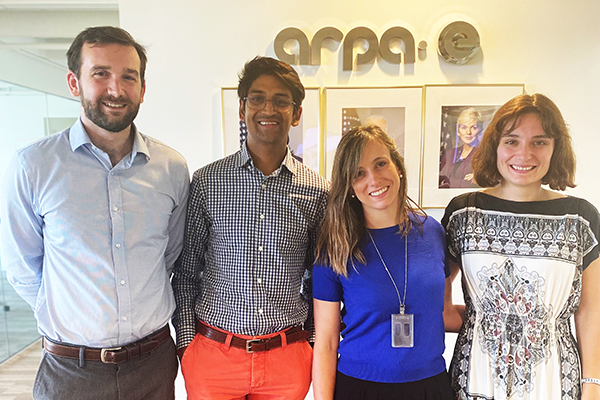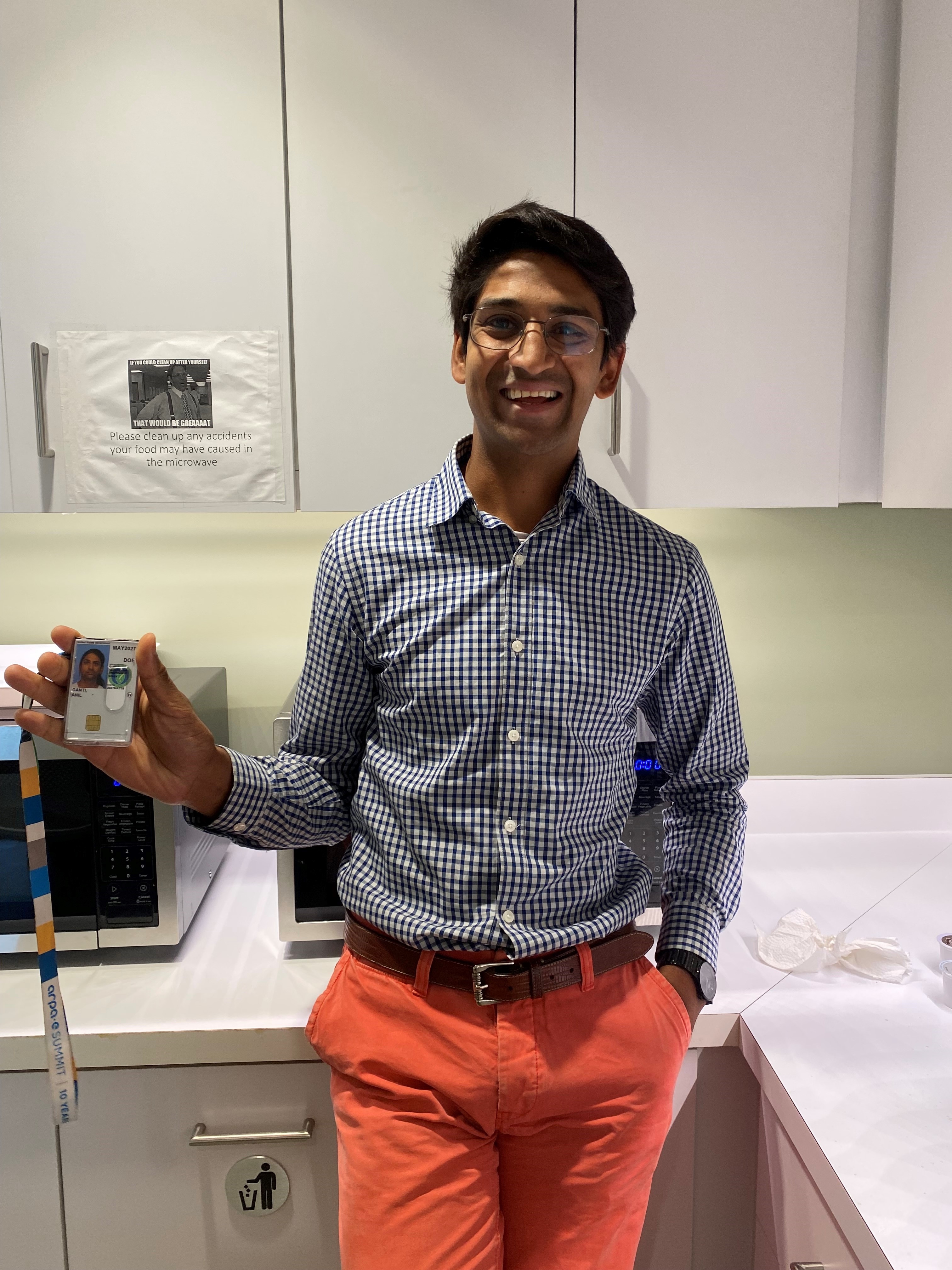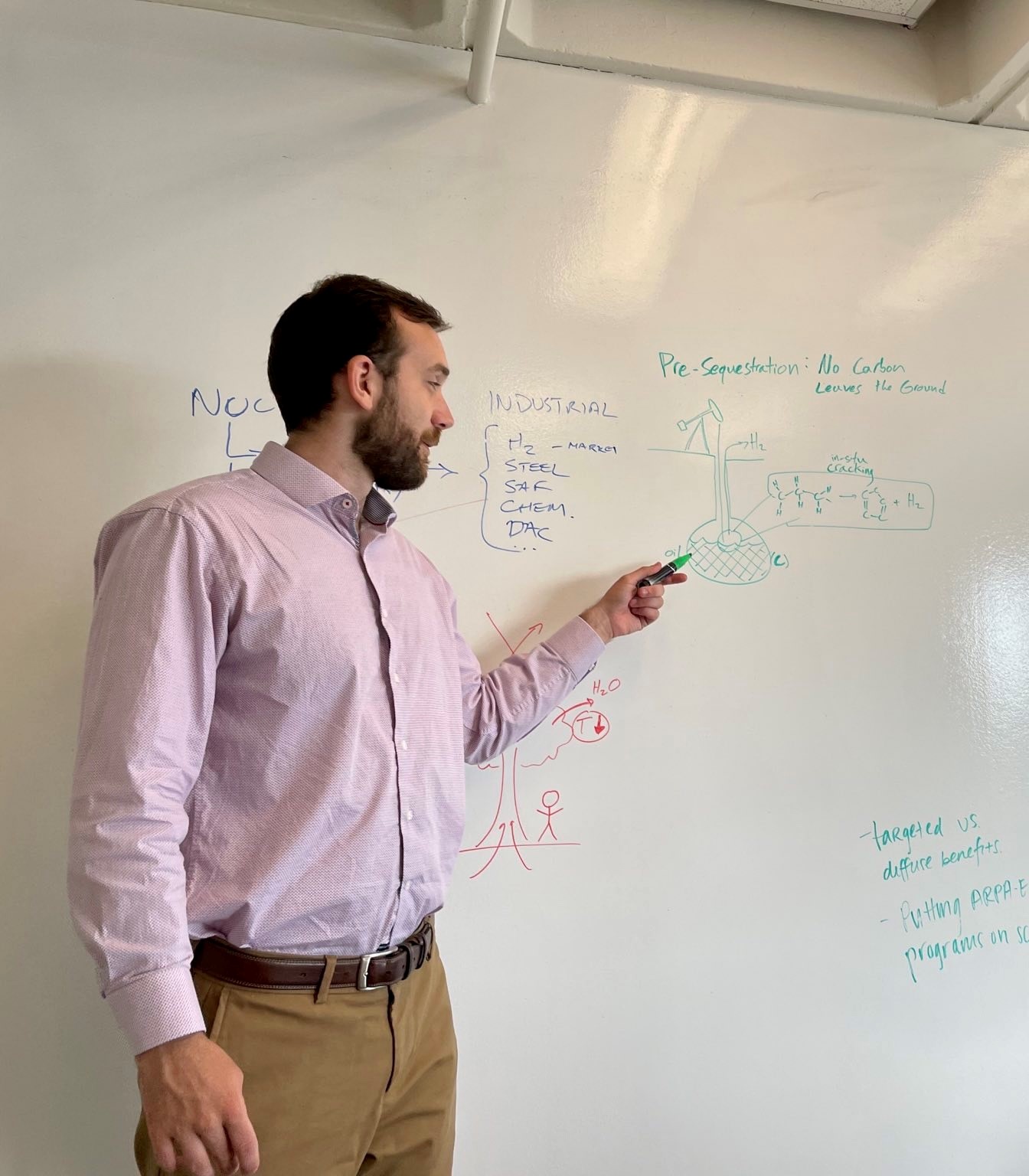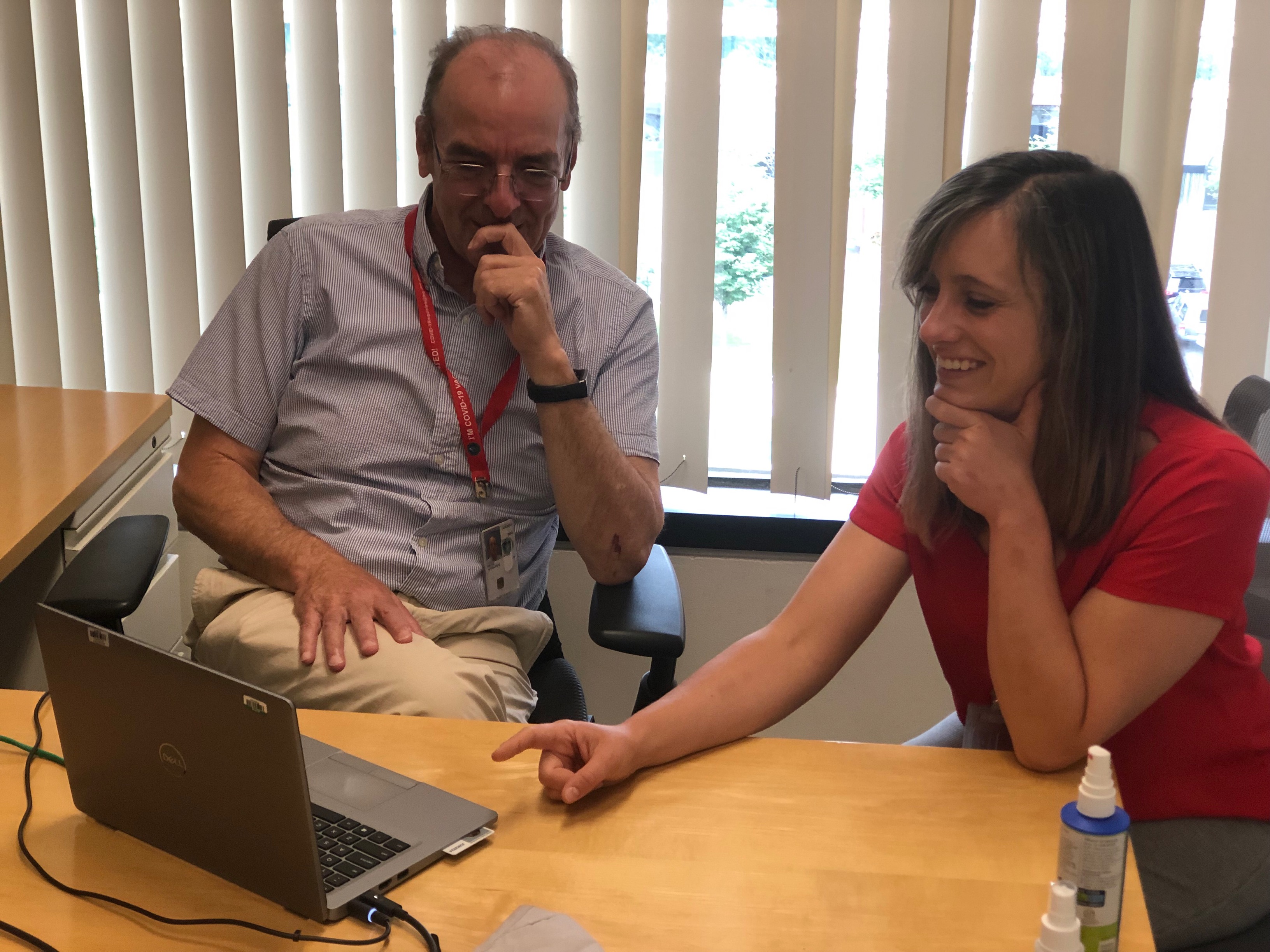
A Day in the Life of an ARPA-E Fellow
ARPA-E brings together top minds in energy research, development, and commercialization to explore high-risk, high-reward technologies that could change what’s possible in how we use, generate, and store energy. Our team of Fellows – early-career Ph.D. scientists and engineers who assist with program creation, agency strategy, and outreach – actively help shape the strategic direction and vision of an agency devoted exclusively to transformational energy technology research and development, all while undertaking their own independent explorations of promising future research areas for the agency.
Currently, the ARPA-E Fellows team comprises Dr. Anil Ganti, Dr. Katharine Greco, Dr. Jake Russell, and Dr. Emily Yedinak. While every day is different for each of our Fellows, we spent a day with all of them to give you a window into how they spend their time at ARPA-E.
Dr. Anil Ganti

(Dr. Anil Ganti celebrates a successful rite of passage: obtaining his DOE badge)
Dr. Anil Ganti is our newest ARPA-E Fellow, having joined in June 2022. His areas of interest include sensing technologies, machine learning for energy applications, wireless power, and the food-energy-water nexus. On one of his first days, Anil met several of ARPA-E’s Program Directors (PDs) – leading scientific researchers in their respective fields who join ARPA-E for 3-year terms to develop new R&D programs – to discuss areas of technical interest and potential overlap.
“I was impressed by each of the PD’s wide areas of interest and I made several unexpected connections in these meetings. The PDs I met with were happy to discuss their ideas and include me in their program development efforts regardless of my specific technical background.”
Anil also spent time meeting with ARPA-E’s Tech SETAs (Science and Engineering Technical Assistants), who support the PDs in program creation and management. Tech SETAs at ARPA-E are experts in their field, bringing much needed experience to launching new programs and shepherding project teams through their projects with ARPA-E.
“Since Tech SETAs are not term-limited they carry an enormous amount of institutional knowledge, which is needed to assess what has already been explored at ARPA-E previously.”
Anil in his first week also joined ARPA-E’s internal weekly brown bag seminars, known as HOPPERs, which are a way for Fellows and PDs to share with the Agency their current ideas and thinking.
“One of the things I’m adapting to at ARPA-E is working to identify technical problems rather than solutions. Discovering what problems are worth solving, why they matter, and their impact is integral to ARPA-E’s mission. I’m also quickly getting comfortable in asking questions and making contributions outside of my field.”
Anil has hit the ground running during his time at ARPA-E. Welcome Anil!
Dr. Jake Russell

(Dr. Jake Russell whiteboarding with colleagues in one of ARPA-E’s dedicated collaboration spaces)
Dr. Jake Russell joined ARPA-E in the spring of 2021. His technical areas of interest include maritime and port decarbonization, intermodal transportation, zero-carbon fuels, ocean carbon dioxide removal, superconductors, insect farming, and social barriers to energy infrastructure siting. Jake took us along on his day spent working on the SEED program Energy Brief series.
“Today I’m working on creating a handful of videos highlighting the awardees of the SEED Exploratory Topic for our Energy Briefs video series. SEED (Seeding Entrepreneurial Energy Discoveries) focuses specifically on small business R&D projects, and it is the Fellows’ responsibility to advertise the funding opportunity and source applicants, manage the application selection process, and participate in the merit review that leads to project selection. We interact closely with awardee teams throughout the course of their projects to provide feedback, guidance, and technical input.
To advertise the 2022 SEED FOA, I created the SEED Energy Brief mini-series which highlighted several SEED awardees. Each Fellow selected a team to highlight based on their interest area. This had the added benefit of giving SEED teams valuable exposure and a platform to discuss their technologies. In one video, I interview Sublime Systems Co-Founder & CEO Dr. Leah Ellis, and we dived into Sublime’s electrochemical zero-emissions cement technology. To prepare for the interview, I studied up on Sublime’s technology and prepared a list of questions. At the end of the day, I recorded the virtual interview with Leah and with the help of the ARPA-E Communications team.”
Dr. Emily Yedinak

(Left to right: Dr. Doug Wicks and Dr. Emily Yedinak discussing technical white spaces)
Our day with Dr. Emily Yedinak was spent learning how she maps scientific white spaces to identify potential technical areas ARPA-E might invest in. Her areas of interest include subsurface energy systems, geologic hydrogen, and materials supply chains.
“White space mapping means finding technology opportunities in energy that are less familiar but could yield tremendous results if explored further. White space mapping is central to ARPA-E’s mission of investing in high risk, high reward technology. There are a number of reasons that could lead to a white space in a technology; examples are timing, outdated technical approaches, and risk perception.”
Emily showed us that an essential aspect of approaching a new white space includes stakeholder engagement and outreach to learn about the state-of-the-art, and what might come next.
“My goal as a Fellow is to catalyze a new conversation around natural hydrogen, and I’ve been building momentum in this area both internally and externally by socializing my idea at the Agency, giving internal and external presentations, and participating in DOE-wide initiatives. During my time at ARPA-E, I’ve written two Requests for Information (RFIs) to pose questions to the broader community about specific technical areas to gain more insight into potential new program development. More recently, I’ve organized an “interagency” meeting with folks from NASA, NSF, DOE, and USGS focused on natural hydrogen and pitched the vision for natural hydrogen to external stakeholders to bring awareness to this potential resource.”
You can find more information on the work Emily has done to promote natural hydrogen below:
- A published article on the role of natural hydrogen
- A video of an external talk at Cornell
- A “Fast Pitch” at the 2022 ARPA-E Energy Innovation Summit
”Working at ARPA-E provides a platform to engage with a large audience in ways that are often not available to early-career folks. I’ve given external talks at the HNat Summit 2022, the American Rock Mechanics Association (ARMA) workshop on ‘Emerging Opportunities in Geologic Hydrogen Storage and Carbon Sequestration.’
To me, the most fun part of outreach is connecting groups together to potentially form new collaborations.”
Dr. Katharine Greco

(Dr. Katharine Greco on stage at the 2022 ARPA-E Energy Innovation Summit)
We caught Dr. Katharine Greco on a day she was preparing her Fast Pitch for the main stage at the 2022 ARPA-E Energy Innovation Summit. Fellows give Fast Pitches – a 7-minute presentation on an emerging and disruptive energy concept – on the main stage at the annual ARPA-E Innovation Summit. Katharine’s Fast Pitch, titled “Primordial Soup for the Soul: CO2 to Protein”, discussed technical pathways to convert CO2 to food and food molecules without agriculture. Her broader technical areas of interest are agricultural decarbonization, scalable bioreactors, and fusion technologies.
“I spent the day working on my Fast Pitch for the upcoming ARPA-E Summit. I’m excited about the idea of “food without agriculture” – can we synthesize food the way we synthesize other industrial commodities? In my talk I’m planning on discussing three pathways: biological conversion, cell-free enzymatic synthesis, and electrochemical catalysis. These pathways are based on the white space mapping of the technology space that I’ve been working on since I joined the Agency. Today I’m deciding what information is the most relevant and interesting to the scientific audience that will be present at the Summit. Trying to distill all of the information I’ve learned in the past few months into a 7-minute pitch is really helping me clarify and focus my thinking in this area.
After I finished a draft of my slides, I finished the day practicing my delivery and timing. I received feedback from the ARPA-E Communications Team, and the PDs who also are participating in the Fast Pitch “Natural Resources” group – Dr. Simon Freeman, Dr. David Tew, and Dr. David Babson.”
